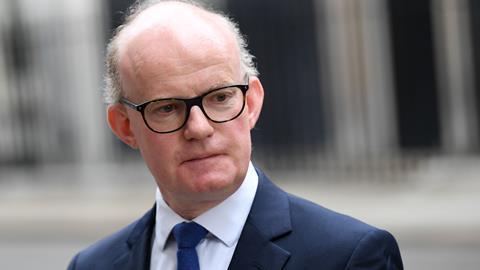New guidance for use in suspected ‘mercy killings’ will not decriminalise murder or manslaughter, the head of the Crown Prosecution Service assured me this week. Max Hill QC (pictured), who became director of public prosecutions in 2018, was explaining how the CPS would handle cases where homicide suspects believed they had been acting wholly out of compassion. A public consultation on the guidelines is being launched today.

The guidance would apply only if there was enough evidence to provide a realistic prospect of conviction. It is at this stage that a prosecutor must consider whether charges would be in the public interest or no further action is required.
Under the new guidelines, a prosecution would be more likely if the victim was under 18; or lacked mental capacity; or had not reached and communicated a voluntary, clear, settled and informed decision. Charges would also be more likely if the suspect stood to gain from the killing and was not wholly motivated by compassion. A person in authority over the victim – such as a doctor or nurse, a professional carer or a prison officer – would be at greater risk of prosecution than a close relative. So would a suspect unknown to the victim or someone who had harmed the victim in the past.
Prosecution would be less likely if the deceased had been unable to take their own life because of serious physical illness; or if a reluctant suspect had been put under pressure by a determined victim; or if the suspect had taken part in a genuine but unsuccessful suicide pact; or if the suspect had reported the death to the police and helped with their enquiries.
The current guidance for homicide says that ‘a prosecution is almost certainly required, even in cases such as “mercy killing” of a sick relative’. But Hill told me that the new guidelines would not necessarily make a change to the way these cases were handled. Prosecutors were already using their discretion not to charge devoted partners with killing a loved one.
If new guidelines are needed, surely the current ones must be inadequate? ‘I don’t think I would go that far,’ Hill told me. ‘Every case of this type is very carefully considered.’ But it was right to put the existing guidance into writing, as had been done more than a decade ago for cases of assisting or encouraging suicide.
Under the draft guidelines, a case could be regarded as a mercy killing if ‘the suspect takes the life of the victim and believes they are acting wholly out of compassion for the deceased or at the request of the deceased’. I suggested to the DPP that this definition looked entirely subjective. Surely the suspect’s belief needed to be reasonable?
Hill explained that the guidelines themselves were based on objective tests: was there evidence that the suspect was motivated by compassion? Was there evidence of the deceased’s wishes?
If these guidelines were confirmed, I suggested, that might take some of the pressure off the government to legalise euthanasia. There would still have to be a police investigation – and the CPS was not offering any assurances – but relatives who followed the guidance could be reasonably confident of avoiding criminal charges.
‘We are not lawmakers,’ Hill told me firmly. ‘We are not seeking to influence parliament or to encroach on the function of central government.’ As prosecutors, they had to take the law as they found it, apply the code for Crown prosecutors and charge the right person with the right offence.
‘We are absolutely not decriminalising any form of homicide’ he insisted. ‘And it’s important to remember that mercy killing cases can result in indictment and prosecution for murder.’ That would continue under the new guidelines.
Hill assured me that the consultation had not been prompted by any particular case, nor by concerns that the current guidance was insufficient or inaccurate. But it was important to have a full 12-week consultation and a properly informed public discussion.
I pointed out that some of the draft wording seemed to have been copied across from the suicide guidance without sufficient adaptation. It refers to the victim’s ‘decision to end their life’ when it would actually be the suspect’s decision and the victim’s presumed wish. A reference to the victim being ‘unable to undertake the act’ suggests suicide rather than mercy killing. Hill said he welcomed comments on the draft.
I can see that cases such as these must be among the most difficult that prosecutors have to handle. Nobody wants to see people getting away with murder. On the other hand, a relative who acts with compassion should receive compassion in return.
A consultation such as this is welcome because the public needs to understand – and approve of – decisions that are taken in its name.
joshua@rozenberg.net
































No comments yet